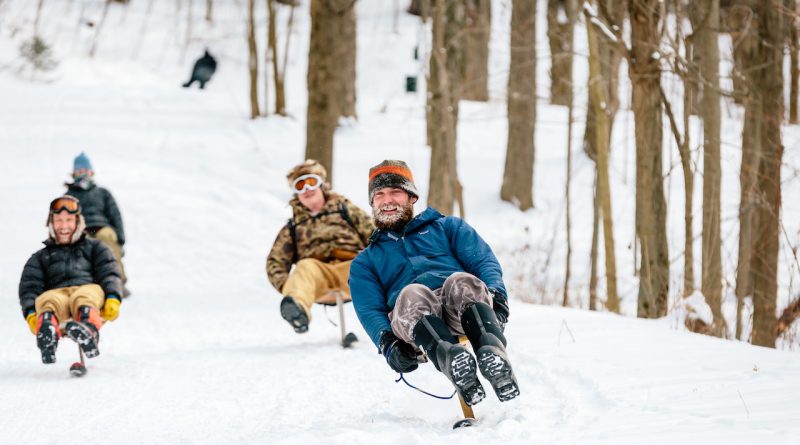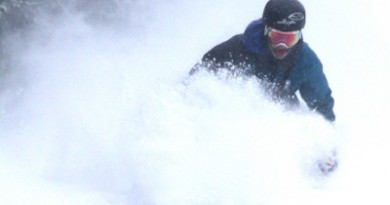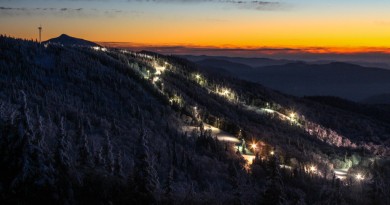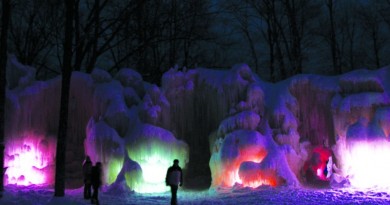And Now For Something Completely Different…
For those with absolutely no fear, there’s always jack jumping. By Leath Tonino
It sounds like the setup for a joke: an ex-world champion, a would-be world champion, and a journalist are cruising Vermont’s winter roads in a minivan on a Sunday morning, looking for a place to buy beer.
The ex-world champion, Ethan Bond-Watts, a 33-year-old glassblower with a blond ponytail, sits behind the wheel. The would-be, Craig Bunten, a 32-year-old carpenter with a scraggly brown beard that’s longer than the hair atop his head, rides shotgun.
A few months from now, these childhood buddies of mine will mount odd snow-sliding devices called jack jumpers—basically a stool attached to a single alpine ski—and square off in a contest for fame (yeah, right), glory (you wish), and a $100 bill (more likely crumpled than crisp) at Mount Snow. Bitter rivalry? Not exactly. At the moment, picking up a couple twelvers is the top priority.
“Some session IPAs? Keep things civil on the hill today?”
“What about a chocolate stout, a breakfast milkshake?”
Held the first weekend in March (March 4, this year) at Mount Snow in West Dover, the Jack Jump World Championship has been going strong for 39 years. Competitors race down a dual slalom course, side by side. They’re not racing one another—they’re racing the clock. After two runs, the best combined time wins the championship.
Racers are drawn to Mount Snow from the Green Mountains’ deep hollows, from its crooked barns and cluttered garages—a semi-inebriated, fully-obsessed gang of hobbyists. I say “fully obsessed” because jack jumping is as much a proud pastime, a homespun folk tradition unique to Vermont, as it is an action sport.
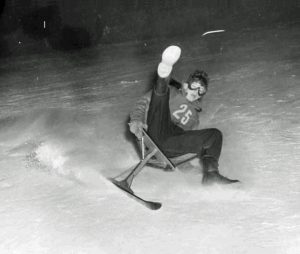 That doesn’t mean devotees eschew aggressive ripping—Bond-Watts and Bunten have reached what they refer to as “felonious” speeds (50 miles per hour on groomers). But the pleasure of adrenaline is paired with the pleasure of history, of knowing that farm kids have been shredding the local topography since at least the 1800s (early JJs featured a barrel stave in lieu of a ski) and that loggers once used a kind of proto-JJ to exit the woods after a hard day’s sawing.
That doesn’t mean devotees eschew aggressive ripping—Bond-Watts and Bunten have reached what they refer to as “felonious” speeds (50 miles per hour on groomers). But the pleasure of adrenaline is paired with the pleasure of history, of knowing that farm kids have been shredding the local topography since at least the 1800s (early JJs featured a barrel stave in lieu of a ski) and that loggers once used a kind of proto-JJ to exit the woods after a hard day’s sawing.
Jack jumpers have never been mass produced, let alone mass marketed. At the 2016 World Championship, which saw 70 competitors—56 adults, 14 children—every rig was personalized, custom-made and funky. Some boasted antique tractor seats and shock-absorbing springs, others a seatbelt allowing for arms-free carving.
Bunten’s got a fancy one in the back of the minivan nicknamed The Smithsonian (maple post, horseshoe handles), and Bond-Watts also has a “museum piece” (walnut post, brass tacks on an upholstered seat). But don’t be fooled by the fine craftsmanship: the skis on these things are dumpster-salvaged junkers—yard sale scores at best—and their graphics (read: brand names) are hidden beneath layers of sloppily applied spray paint.
“I waxed mine with lip balm the other day,” Bond-Watts says, emphasizing the goofy, playful side of the sport.
Thirty minutes and one liquor store later, at the foot of Lincoln Gap, an unplowed pass that crosses the Green Mountains’ spine at a sustained grade of 24 percent, we park the minivan in front of a “Road Closed” sign. While Bolton Valley and Jay Peak allow jack jumpers on the slopes, and Mount Snow hosts its iconic race, for the most part the sport hews to its backwoods past.
The east side of Lincoln Gap, dropping toward the village of Warren, offers two miles of twists and turns, dips and dives—a guaranteed smile-till-your-face-hurts descent. If there’s an ideal training ground for the World Championship, this is it.
Beneath a gauzy gray sky, we load Bunten’s daypack with enough beer to stun a horse (for the record, both IPAs and stouts), toss a rack of all-natural beef franks in with the cans, and prepare for the hike. Standard jack-jumping attire is more rags than riches: tall rubber boots like those that dairy farmers wear when mucking out the barn, Patagonia jackets so torn and stained that they appear to have been found somewhere within said mucky barn, baggy Carhartt pants, floppy wool hats of uncertain provenance.
“These were the second-place prize last year,” Bunten explains as he pulls on a pair of tattered, seam-busted gloves. “Mark Stirewalt, from up in Waterbury, he beat me by four one-hundredths of a second. Can you believe that? I came into the finish fully laid out, begging for whatever time I could get, and plowed through the spectator fence. Regrettably, I knocked down a ten-year-old girl. She was balling, her mom was shocked and I was like, ‘How’d I do?’”
“At least you podiumed,” Bond-Watts responds, shaking his head in mock dejection. “I used to be the Champ, the Guy. I won three out of four years. And now?”
“You brought shame upon your family by finishing fourth last spring.”
“The kids don’t talk about me anymore. They’ve forgotten my name.”
“Complacency. Lack of drive. A sad story.”
With that, we sling jack jumpers over our shoulders and hoof it toward the crest of the state. No lifts, no lift lines, no nonsense. Just two inches of fresh powder and an intention to flow, to fly.
At the top of the pass there’s nobody around, just pillowed conifers and more pillowed conifers, a view of distant bluish mountains through the cracks between trunks—we sit down (chairs are always available when jack jumping, which is awesome) and debate whether to make a bonfire for the hot dogs immediately or wait until after our first run.
Tucker Bond-Watts, the Ex’s younger brother, shows up mid-deliberation, having received word of our whereabouts via text message. He spent the past four hours alpine skiing at nearby Sugarbush, where he has a season pass, but cut out after lunch to meet us here, the JJ that lives in the bed of his truck coming in handy not for the first time, and not for the last.
He shrugs, reaches into Bunten’s daypack for a refreshment. Click. “It’s like a damn call center up there. Hordes on their phones. ‘Dude, where are you? I’ll meet you in ten minutes. Call me when you get there. Wait, where are you?’ Honestly, it’s intolerable. And on top of that”—he glances at the Ex, whose ponytail is folded inside his hood—“they’ve all got ponytails.”
We laugh, imbibe, keep laughing, and forget about the picnic. Eventually, our buzzes rising and toes going numb, it’s time to act. At low speeds, a jack jumper is wobbly. At high speeds, it is as secure as Shaun White’s snowboard. Which is to say that the first hundred feet of flattish road make us look like a gang of toddlers learning to operate bicycles sans training wheels (except instead of holding handlebars, we’re gripping the undersides of our seats, legs extended out front in the manner of a hamstring stretch). Then, without a pistol shot or dropped flag, without any warning besides the hint of Bunten pulling ahead as the pitch steepens, our kiddie bikes transform into rocket-fueled booster chairs. And the race is on.
Bitter rivalry? Again, not exactly. It’s fun to weave in and out of the pack, to jostle for position, to hip check and shoulder check, to spray your buddy with a rooster-tailing bank turn while calling him names unfit for publication.
Making it down in the lead, though, is entirely beside the point. In fact, caught up in the joy of gravity, in the grip and rush of this favorite “trail”, there is no point. We’ve reached DIY nirvana, flannel-lined enlightenment, middle-of-nowhere bliss. We are one with the road, one with the season, one with the jack jumpers (things) beneath our butts and the jack jumpers (people) who extend back through the ages in an unbroken chain.
I close in on the Would-Be, reading his line, and pass on the right. The Ex drafts me for a second before passing on the left.
Lobotomizing wind. Tears on cheeks Crystalline perception meets crazy blur.
One, two, three, four massive, energy-dispersing power slides and the run is over, a mere five minutes after it began. Everyone is grinning that mindless grin—the grin that appears after piddling thoughts have been scoured from consciousness by pure contact with pure elements. Here is the hush, the fleeting moment in a jack jumper’s day when no trash is talked, no extemporaneous disquisition on meaning or heritage or immortality offered to the mute forest.
Bunten stands, shakes a cake of snow from his voluminous beard (plus a few muffins, maybe even a scone), and dispenses libations. “You’ve got to race like you practice,” he says, looking up the slope at our crisscrossing tracks. “Just shut the brain off and ride the edge.”
Click, click, click, click.
“I’m feeling good about Mount Snow this year.”
Top photo by Oliver Parini

